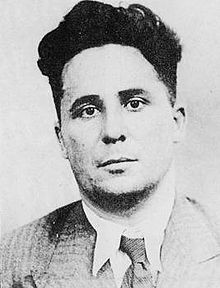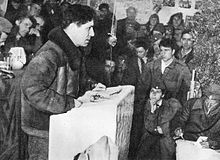Nikos Zachariadis | |
|---|---|
| Νίκος Ζαχαριάδης | |
 A photo of Zachariadis, from the 30 May 1945 edition of Rizospastis. | |
| General Secretary of the Communist Party of Greece | |
| In office 1931–1956 | |
| Preceded by | Andronikos Haitas |
| Succeeded by | Apostolos Grozos (temporary) |
| Personal details | |
| Born | 27 April 1903 Adrianople, Ottoman Empire (modern-day Edirne, Turkey) |
| Died | 1 August 1973 (aged 70) Surgut, RSFSR, USSR (modern-day Russian Federation) |
| Resting place | Athens |
| Spouse(s) | Mania Novakova Roula Koukoulou (1948 - ) |
| Children | Kiros, Olga, Sifis |
| Parent | Panagiotis Zachariadis (Father) |
| Signature | |

Nikos Zachariadis (Greek: Νίκος Ζαχαριάδης; 27 April 1903 – 1 August 1973) was General Secretary of the Communist Party of Greece (KKE) from 1931 to 1956.
He was appointed, by order of Stalin and the Comintern, General Secretary of KKE in 1935. He was arrested by the right-wing Metaxas dictatorship the following year. From prison, he lent his political influence to a united antifascist front following Italy's invasion of Greece on October 28, 1940. Despite his efforts to encourage unity and resistance in the face of fascist aggression, Zachariadis remained imprisoned and when the Nazis ultimately invaded and occupied Greece in 1941, Zachariadis was transferred to Dachau concentration camp, where he remained until the camp was liberated by the US Army in May 1945.
Along with Markos Vafiadis, Zachariadis was an integral figure in the formation and operations of the KKE-led Democratic Army of Greece (DSE) during the Greek Civil War of 1946–1949. Following the collapse of the military effort in 1949, Zachariadis and other leaders of the DSE retreated to Tashkent, capital city of Uzbekestan SSR. He continued to receive support as the General Secretary of the "exterior" branch of KKE until the death of Joseph Stalin in 1953.
Zachariadis fell out of favor with the Tashkent branch of KKE in 1955 and, following some infighting, he was removed from his post — ostensibly with the support and approval of Nikita Khrushchev — by May 1956. Zachariadis was expelled from KKE the following year.
Zachariadis spent the rest of his life in exile in Siberia, initially in Yakutia and later in Surgut, where — according to official KGB records — he committed suicide in 1973. His body was returned to Greece in 1991 following the fall of the Soviet Union.[1]